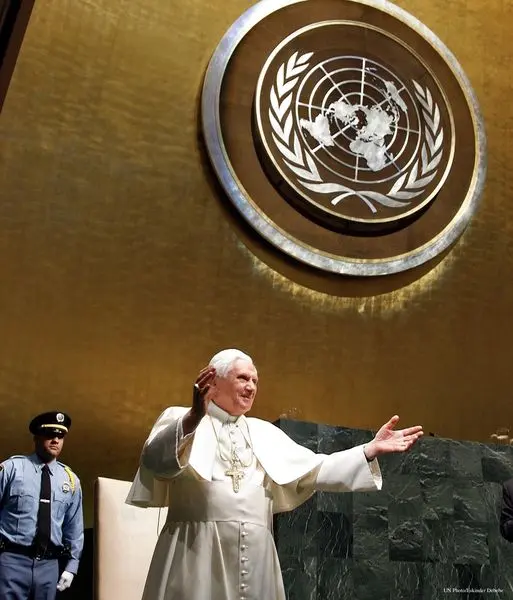 On Christmas Day in 2005, Pope Benedict XVI released an encyclical on the practice of Charity in Truth. In this encyclical (a letter to the Churches), the Pope seeks to develop Christian social teaching, as taught by Popes who went before him. It is intriguing to see the Pope mirroring the teachings of Sri Sathya Sai in a number of places, and without so much as naming human values, he promotes the proper practice of human values.
On Christmas Day in 2005, Pope Benedict XVI released an encyclical on the practice of Charity in Truth. In this encyclical (a letter to the Churches), the Pope seeks to develop Christian social teaching, as taught by Popes who went before him. It is intriguing to see the Pope mirroring the teachings of Sri Sathya Sai in a number of places, and without so much as naming human values, he promotes the proper practice of human values.
The Encyclical is named from the first words, Deus Caritas est (Charity in Truth). The following is taken from the introduction to the Encyclical.
Truth
To defend the truth, to articulate it with humility and conviction, and to bear witness to it in life are therefore exacting and indispensable forms of charity. Charity, in fact, “rejoices in the truth” (1 Cor 13:6).
Love and Truth
All people feel the interior impulse to love authentically: love and truth never abandon them completely, because these are the vocation planted by God in the heart and mind of every human person. The search for love and truth is purified and liberated by Jesus Christ from the impoverishment that our humanity brings to it, and he reveals to us in all its fullness the initiative of love and the plan for true life that God has prepared for us.
Human Values are eternal, the universe rests upon human values, and indeed, as part of creation, follows and practises human values, for every atom of the universe is an atom of the divine Atma. And within the Divine Atma, these values exist. Pope Benedict is quite right to say that Charity and Truth are the vocation planted within the hearts and minds of every person. We are of course, impoverished by maya, delusion that what is seen is all there is. This is not the truth. So Benedict says that our basic humanity (ego, grasping, seeking, desiring) impoverishes life if it is life without human values. God is self-revealing; the nearer we come to God, the more he reveals of himself; therefore, the more closer we come to these values and practise them – the more he reveals of the intrinsic nature of human values. This is what a life practising human values does for you. Human Values exist within the person, and they are elicited by educare, drawing out what is within.
Charity (love in action) has been misconstrued …
I am aware of the ways in which charity has been and continues to be misconstrued and emptied of meaning, with the consequent risk of being misinterpreted, detached from ethical living and, in any event, undervalued. In the social, juridical, cultural, political and economic fields — the contexts, in other words, that are most exposed to this danger — it is easily dismissed as irrelevant for interpreting and giving direction to moral responsibility. Hence the need to link charity with truth not only in the sequence, pointed out by Saint Paul, of veritas in caritate (Eph 4:15), but also in the inverse and complementary sequence of caritas in veritate. Truth needs to be sought, found and expressed within the “economy” of charity, but charity in its turn needs to be understood, confirmed and practised in the light of truth.
The Pope is saying that love in action without following the truth has become love emptied of meaning. Truth needs to be found, sought and expressed with love, which in turn needs to be understood, and practised in the light of the truth.
Truth is found in everyday living; there are those who are reluctant to acknowledge this:
In this way, not only do we do a service to charity enlightened by truth, but we also help give credibility to truth, demonstrating its persuasive and authenticating power in the practical setting of social living. This is a matter of no small account today, in a social and cultural context which relativises truth, often paying little heed to it and showing increasing reluctance to acknowledge its existence.
Love is distorted without Truth:
Without truth, charity degenerates into sentimentality. Love becomes an empty shell, to be filled in an arbitrary way. In a culture without truth, this is the fatal risk facing love. It falls prey to contingent subjective emotions and opinions, the word “love” is abused and distorted, to the point where it comes to mean the opposite.
Religion without Values:
In the present social and cultural context, where there is a widespread tendency to relativise truth, practising charity in truth helps people to understand that adhering to the values of … (religion) … is not merely useful but essential for building a good society and for true integral human development. A Christianity of charity without truth would be more or less interchangeable with a pool of good sentiments, helpful for social cohesion, but of little relevance. In other words, there would no longer be any real place for God in the world. Without truth, charity is confined to a narrow field devoid of relations.
Conscience, Truth and Love:
Development, social well-being, the search for a satisfactory solution to the grave socio-economic problems besetting humanity, all need this truth. What they need even more is that this truth should be loved and demonstrated. Without truth, without trust and love for what is true, there is no social conscience and responsibility, and social action ends up serving private interests and the logic of power, resulting in social fragmentation, especially in a globalized society at difficult times like the present.
Coda
(or how Pope Benedict opens the Encyclical … )
“God is love, and he who abides in love abides in God, and God abides in him” (1 Jn 4:16). These words from the First Letter of John express with remarkable clarity the heart of the Christian faith: the Christian image of God and the resulting image of mankind and its destiny. In the same verse, Saint John also offers a kind of summary of the Christian life: “We have come to know and to believe in the love God has for us”.
We have come to believe in God’s love: in these words the Christian can express the fundamental decision of his life. Being Christian is not the result of an ethical choice or a lofty idea, but the encounter with an event, a person, which gives life a new horizon and a decisive direction… … In a world where the name of God is sometimes associated with vengeance or even a duty of hatred and violence, this message is both timely and significant. For this reason, I wish in my first Encyclical to speak of the love which God lavishes upon us and which we in turn must share with others.

![]()

